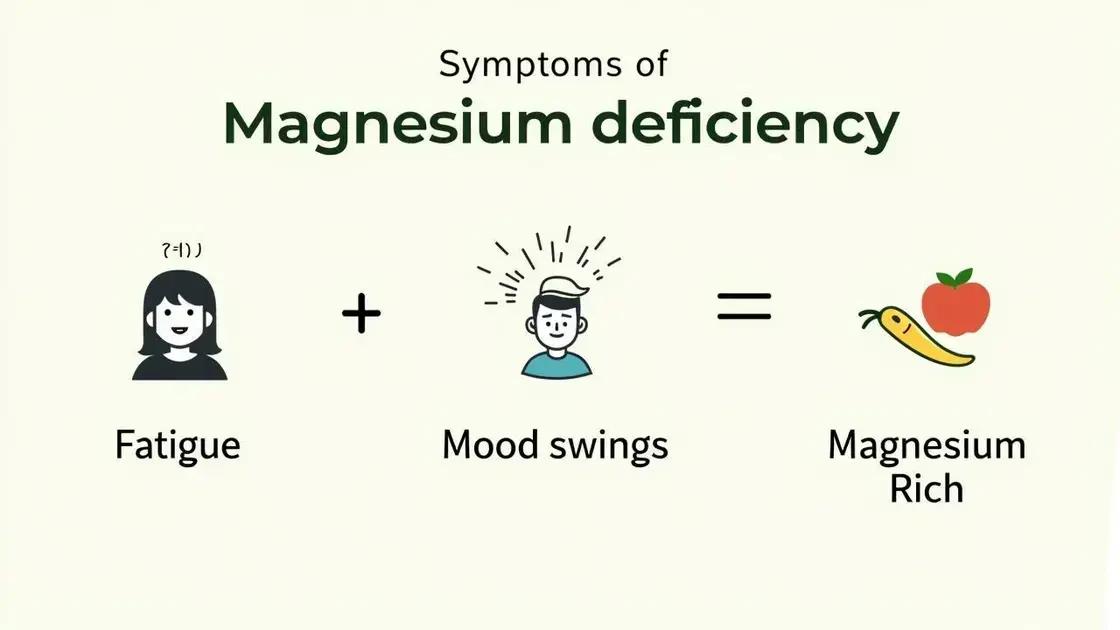The importance of magnesium for stress reduction lies in its ability to regulate neurotransmitters, support muscle relaxation, and mitigate physical and mental symptoms of stress. Incorporating magnesium-rich foods and practices into your routine can significantly enhance your overall well-being and stress management.
Stress is an inevitable part of life, but did you know that magnesium plays a crucial role in stress reduction? This essential mineral helps regulate neurotransmitters and aids in muscle relaxation, making it vital for maintaining mental and emotional well-being. In this article, we will explore the significance of magnesium in stress relief, its natural sources, and practical ways to incorporate it into your daily routine for optimal health and relaxation.
Understanding Magnesium and Its Role in Stress Relief

Magnesium is a vital mineral that plays an essential role in various bodily functions, including stress relief. It helps regulate the body’s response to stress by supporting the function of neurotransmitters, which transmit signals in the brain. When the body is under stress, magnesium levels can deplete rapidly, making it crucial to maintain adequate magnesium in your diet.
How Magnesium Works in the Body
Magnesium helps to balance calcium levels in the body, which can affect muscle tension. When calcium levels rise due to stress, magnesium helps to keep muscles relaxed, thus reducing the physical symptoms of stress. Furthermore, magnesium supports the body’s production of serotonin, a key neurotransmitter that contributes to feelings of well-being and happiness.
The Connection Between Magnesium and the Nervous System
The nervous system relies heavily on magnesium for proper function. It aids in regulating the release of stress hormones and helps to calm the nervous system. A balanced magnesium level can lead to better sleep quality, increased energy, and an overall enhanced mood, which all contribute to better stress management.
Everyday Sources of Magnesium
Incorporating magnesium into your diet is simpler than you might think. Foods rich in magnesium include leafy greens, nuts, seeds, whole grains, and dark chocolate. Making a conscious effort to include these foods in your meals can help ensure you are getting enough of this crucial mineral.
How Magnesium Deficiency Affects Stress Levels

A lack of magnesium in the body can lead to several physical and mental issues, particularly when it comes to managing stress. Magnesium deficiency can trigger increased levels of stress hormones, such as cortisol. This can lead to feelings of anxiety, irritability, and mood swings.
Physical Symptoms of Deficiency
When magnesium levels are low, the body may experience physical symptoms like muscle cramps, fatigue, and headaches. These physical discomforts can contribute to heightened stress levels, creating a cycle of stress and deficiency. Addressing magnesium deficiency may help in reducing these physical stressors.
Impact on Mental Health
Low magnesium levels have been linked to mental health conditions like depression and anxiety. Inadequate magnesium can hinder the effective regulation of neurotransmitters, leading to disturbances in mood and overall mental well-being. These changes can make it more challenging to cope with daily stressors.
Identifying Deficiency
Many people do not realize they are magnesium deficient. Common indicators include fatigue, muscle weakness, and changes in mood. Maintaining a balanced diet rich in magnesium can help avoid deficiency and its associated stress effects.
Acknowledging the Importance of Magnesium
Understanding the connection between magnesium deficiency and stress levels is essential. By recognizing how important this mineral is for our mental and physical health, we can take proactive steps to include magnesium-rich foods in our diet. Doing so can help foster a calmer, more balanced life.
Natural Sources of Magnesium for Daily Intake

Adding magnesium-rich foods to your diet is a tasty way to boost your magnesium intake. Here are some natural sources you can enjoy daily:
Leafy Greens
Leafy greens such as spinach, kale, and Swiss chard are excellent sources of magnesium. Incorporating these greens into salads or smoothies can provide a nutritious boost.
Nuts and Seeds
Nuts and seeds are not only a great snack but are also packed with magnesium. Almonds, cashews, and pumpkin seeds are particularly rich in this mineral. Adding them to your yogurt or oatmeal can enhance both flavor and nutrition.
Whole Grains
Whole grains like brown rice, quinoa, and barley contain significant amounts of magnesium. They can be used as a base for meals, making them a versatile and healthy choice.
Legumes
Legumes, including beans, lentils, and chickpeas, are another fantastic source of magnesium. They are not only nutritious but also filling, making them perfect for soups, salads, and various dishes.
Dark Chocolate
Good news for chocolate lovers! Dark chocolate that contains at least 70% cocoa is rich in magnesium. Enjoying a small piece as a treat can be both satisfying and beneficial.
Incorporating Magnesium into Your Self-Care Routine

Incorporating magnesium into your self-care routine can play a significant role in managing stress and enhancing overall health. Here are some easy ways to get started:
Take Magnesium Supplements
If you struggle to get enough magnesium through food, consider taking a supplement. Magnesium citrate and magnesium glycinate are two popular options. Always consult your healthcare provider before starting any supplement regimen.
Create a Relaxing Bath
Soaking in a warm bath with Epsom salt, which contains magnesium sulfate, is an excellent way to relax. The magnesium can be absorbed through the skin, helping you unwind after a long day.
Mindful Eating
Focus on eating magnesium-rich foods regularly. Try to include a serving of nuts, seeds, or leafy greens in every meal. Planning weekly menus can help ensure you get adequate magnesium intake.
Practice Yoga or Meditation
Engaging in practices like yoga or meditation can help you relax and reduce stress. These techniques can also enhance the absorption of magnesium in your body, as a calm mind is more receptive to nutrients.
Stay Hydrated
Drinking enough water is vital for overall health and can aid in the absorption of magnesium. Aim for at least eight glasses a day, and consider infusing your water with magnesium-rich foods like lemon or cucumber.
In Summary: The Vital Role of Magnesium in Stress Reduction
Understanding the importance of magnesium for stress reduction is crucial for maintaining overall well-being. By incorporating magnesium-rich foods into your diet and recognizing the effects of deficiency, you can significantly impact your stress levels.
Incorporating magnesium into your self-care routine through supplementation, relaxation practices, and mindful eating can create a sense of calm and balance in your life. Taking proactive steps to ensure adequate magnesium intake not only promotes physical health but also supports mental and emotional resilience.
In a world where stress is prevalent, prioritizing magnesium can be a simple yet effective way to enhance your self-care practices and lead a more relaxed life.
FAQ – Frequently Asked Questions About Magnesium and Stress Reduction
What is the role of magnesium in stress reduction?
Magnesium helps regulate neurotransmitters and keeps muscles relaxed, which contributes to reducing stress levels.
What are the symptoms of magnesium deficiency?
Symptoms may include fatigue, irritability, muscle cramps, and increased anxiety, which can all impact overall stress management.
What are some natural sources of magnesium?
Foods rich in magnesium include leafy greens, nuts, seeds, whole grains, legumes, and dark chocolate.
How can I incorporate magnesium into my self-care routine?
You can take supplements, enjoy Epsom salt baths, eat magnesium-rich foods, and practice relaxation techniques like yoga and meditation.
How much magnesium do adults need daily?
The recommended daily intake varies by age and gender, but generally, adult men need about 400-420 mg and women need about 310-320 mg.
Can I get too much magnesium?
While it’s rare, excessive magnesium from supplements can lead to side effects like diarrhea and abdominal cramping. It’s best to consult a healthcare provider.












